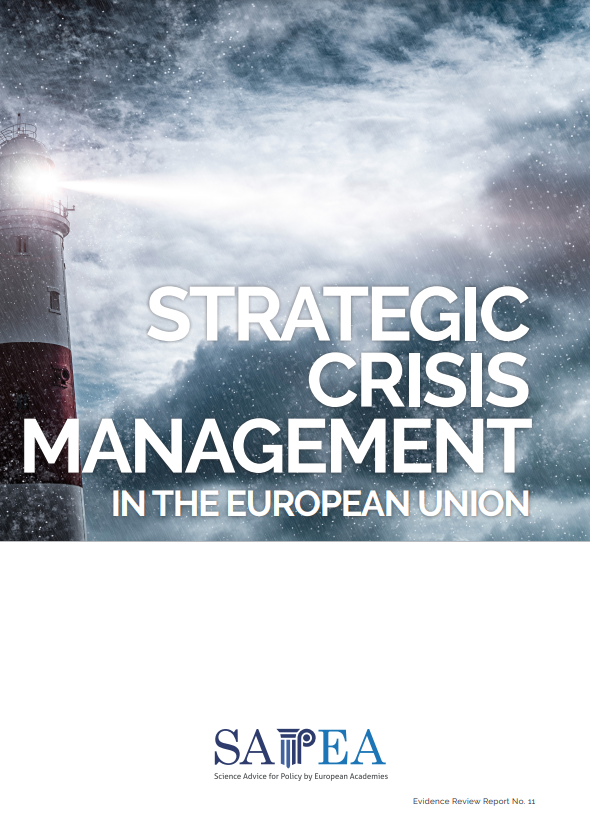The European Union is confronted with an increasing number of crises with growing complexity, causing suffering and other devastating consequences. In response to this challenge, the SAM and the European Group on Ethics in Science and New Technologies are presenting policy recommendations to improve crisis management frameworks.
Evidence review
The European Union is confronted with an increasing number of crises with growing complexity. Their effects can cascade and ripple to all parts of society, the economy, and the environment. The effects of such crises are not limited to specific geographical regions or sectors of society, and many crises continue indefinitely. Because they last, they overlap and amplify each other.
Decisions made during crises are not only urgent, but have long-lasting consequences. Therefore, strategic crisis management needs to be aligned with broader policy objectives. Using digital tools, guidance and standards can be set for strategic foresight and risk monitoring, to ensure that a longer-term perspective is integrated. Better data preparedness can ensure that information can be shared effectively while respecting privacy and security when a crisis hits.
To address the growing complexity of crises, we need a vision that integrates both risk management and crisis management. Different activities and organisations also need to coordinate: responses on multiple geographical and temporal scales need to be aligned, rather than aiming at the one ‘right’ level. Here, the EU could play an important coordinating role. The EU can also play a role in training decision- and policy-makers to coordinate and manage crises.
Crises amplify existing inequalities, hitting the most vulnerable the hardest — and this can erode trust across society at exactly the time when trust is most needed. New technologies and forms of communication offer ways for citizens to be engaged and empowered. Involving civil society can bring many advantages, producing a better informed, tailored, and localised response.
Scientific opinion
From crisis to crisis, the role of the EU has increased. How can the EU improve its strategic crisis management for the future? Based on the latest scientific evidence, the Group of Chief Scientific Advisors recommends that existing and future legislation and instruments should be integrated in a framework that is capable of dealing with increasingly systemic and large-scale crises in a structural way.
A more systemic approach to crisis management should encompass all phases, from preparedness to response and recovery. Synergies should be considered between crisis mitigation measures. The unintended consequences of these measures should also be predicted (as far as possible) and addressed, assessing their impact on society in the longer term.
Preparedness efforts, from stockpiling to training, from contingency planning to exercises and simulations, should be based on lessons learned from past crises and on improved anticipation capacity. It is vital to prepare not only for the direct physical impacts, but also for indirect impacts that may occur far away from where the crisis originated, and for impacts on the functioning of societies as a whole, such as on trust, financial systems, and the mental health of citizens.
It is impossible to fully identify risks and threats. Therefore, we need to build resilience to deal with the complex cascading, cross-border, cross-sector impacts of crises.
To increase the EU’s resilience, we must collaborate closely with society to manage crises effectively; make critical infrastructures more resilient to cascading effects; make existing European financial instruments and resources more scalable, rapidly deployable, and efficient; and provide interoperable, high-quality data, and easy-to-communicate information for crisis management.
Statement on ethics
The European Group on Ethics in Science and New Technologies presents a statement entitled ‘Values in times of crisis’.
Crises can threaten the fundamental values of our society. Decisions must be taken fast and under great pressure, often in contexts of high uncertainty, without a robust evidence base and with little experience.
But European ethical values can also make an important contribution to strategic crisis management. Values play an important role in how we understand and make sense of crises. They influence how we frame the problems that strategic crisis management is supposed to address, and how we choose the instruments to do so.
The fundamental European value of solidarity is particularly relevant. When leaders appeal to solidarity during a crisis, it is often in a tokenistic way — for instance, to demand from people that they comply with measures or accept hardship. This can do more harm than good, especially when governments themselves are seen to act in ways that are detrimental to solidarity.
However, when solidarity is used as a way to decide who we prioritise and who we exclude, or on the ways we establish boundaries between ‘us’ and ‘others’, then it can help to make better, more ethical, and more sustainable decisions. Similarly, solidarity can be a guiding principle for overcoming crises and strengthening societal resilience. This is because it bridges individual and collective needs and interests in the deep awareness of human interdependence across borders, social groups, and other boundaries.



























